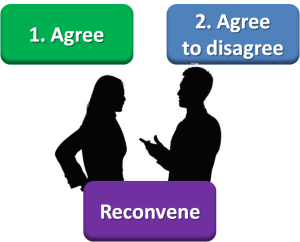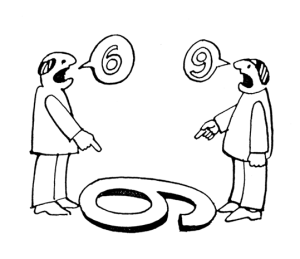I see allowing for the possibility of agreeing-to-disagree, as an essential component in the realm of civil discourse. Let me frame what I mean by agreeing-to-disagree. I believe the conclusion of a healthy, possibly energetic, but respectful, exchange will be:
 We come to an agreement, which could include compromises – and the exchange is concluded.
We come to an agreement, which could include compromises – and the exchange is concluded.- We agree to disagree, allowing the other their own opinion – and the exchange is concluded.
- We agree to reconvene, and work toward conclusion – which is either 1 or 2.
Let me clarify that when I suggest an exchange is concluded (above) that does not necessarily mean the subject is closed or finalized (though it could). I submit it means one topic or segment, among one or more, has been exercised to its’ conclusion.
Using that framework, a few questions to get thoughts flowing:
- Generally, how do you feel about the subject?
- Are you OK with agreeing-to-disagree with someone?
- Do you think it is an unworthy compromise, or copping-out?
- Currently, in personal exchanges and larger social contexts, do you think it is happening:
- too seldom?
- too often?
- often enough?
The answer to that last question, certainly depends on where you stand on the ones preceding it.
To make my own positions clear: I think it is very important; I am OK with it; it is not copping out; and it is happening too seldom.
Certainly, there are some situations where it is easier to incorporate than others. But I submit that we ought to keep it in play as a standard feature of dialog, as much as possible.
I think the ability to agree-to-disagree is crucial to successful, civil discourse, and the advancement of relationships and causes. The importance of spirited exchange, the ability to get to a conclusion, and the fact that I think this occurs too infrequently, are among the reasons I started this blog. I hope to spur more civil discourse.
I hold a deep seated belief in the importance of healthy debate. It was the cornerstone of how this country, its constitution, was established – complex debates, between men of deep conviction and differing views, on the structure of individual rights and government. All those debates resulted in deeply-considered compromises. And by necessity, there would be times separate groups would end up agreeing-to-disagree.
I think the freedom of speech portion of the first amendment was about more than protecting thought and speech. It was also about encouraging them, encouraging continued healthy debate – in order to advance our society. The founding fathers, intentionally or unintentionally, modeled the behavior (certainly not flawlessly). And I think they had faith that their inheritors, citizens and not just successive political representatives, could, and would, follow the example.
It is a mistake to assume this is a special process (following steps 1 – 3) reserved only for the founding of nations or lofty undertakings. It is wholly applicable to one-on-one interactions between friends, family members, and colleagues. Wholly applicable, as long as you are amenable to the possibility that conclusion of a discussion or argument might mean agreeing to disagree.
In this post, I do not intend to cover the points of those who subscribe to the more polar premise that arguments are either won or lost. Some will be won or lost. Many will yield compromises. Many could allow for agreeing-to-disagree. I do intend to cover those ideas more expansively in a successive post.
Conclusion
 In emphasizing the importance of including the option to agree-to-disagree, I’m not suggesting over-willingness to surrender your position, nor taking a shortcut past thorough exploration of ideas. Those who know me well, know how enthusiastically I can go after making a point. I sometimes push hard, and with myriad supporting arguments, to make my ideas and position clear. I do so, understanding that my counterpart (I hesitate to use the word opponent) has the same right to argue the counterpoint(s) with equal vigor. I feel I am obliged, a word I generally dislike, to hear them out as I would have them hear me out. I do so, because I know they have the right to hold, and hold to, an opinion different from mine. I do so, because I know I can gain from the exchange. I do so, knowing it is a path to reaching a conclusion as described above. That conclusion may well end up being agreeing-to-disagree. And if that is where we conclude, we can go our separate ways (or not). I’m OK with that.
In emphasizing the importance of including the option to agree-to-disagree, I’m not suggesting over-willingness to surrender your position, nor taking a shortcut past thorough exploration of ideas. Those who know me well, know how enthusiastically I can go after making a point. I sometimes push hard, and with myriad supporting arguments, to make my ideas and position clear. I do so, understanding that my counterpart (I hesitate to use the word opponent) has the same right to argue the counterpoint(s) with equal vigor. I feel I am obliged, a word I generally dislike, to hear them out as I would have them hear me out. I do so, because I know they have the right to hold, and hold to, an opinion different from mine. I do so, because I know I can gain from the exchange. I do so, knowing it is a path to reaching a conclusion as described above. That conclusion may well end up being agreeing-to-disagree. And if that is where we conclude, we can go our separate ways (or not). I’m OK with that.
